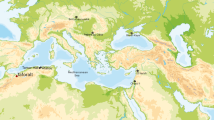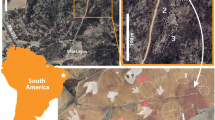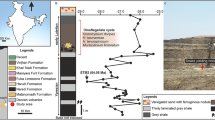Abstract
THE evolutionary origins of human bipedalisms are still poorly understood, but recent discoveries of fossil hominid femora in Africa reveal some interesting details. Especially important are several new fossils discovered by the expedition led by R. E. F. Leakey to East Rudolf, Kenya1–9. The purpose of this paper is to find the morphological and functional affinities among higher primates of these and other fossil femora in the hope of revealing more about the nature of early hominid locomotion.
This is a preview of subscription content, access via your institution
Access options
Subscribe to this journal
Receive 51 print issues and online access
$199.00 per year
only $3.90 per issue
Buy this article
- Purchase on Springer Link
- Instant access to full article PDF
Prices may be subject to local taxes which are calculated during checkout
Similar content being viewed by others
References
Leakey, R. E. F., Nature, 231, 241–245 (1971).
Leakey, R. E. F., Nature, 237, 264–269 (1972).
Leakey, R. E. F., Nature, 242, 170–173 (1973).
Leakey, R. E. F., Nature, 242, 447–450 (1973).
Leakey, R. E. F., Mungai, J. M., and Walker, A. C., Am. J. phys. Anthrop., 35, 175–186 (1971).
Leakey, R. E. F., Mungai, J. M., and Walker, A. C., Am. J. phys. Anthrop., 36, 235–252 (1972).
Leakey, R. E. F., and Walker, A. C., Am. J. phys. Anthrop., 39, 205–222 (1973).
Walker, A. C., J. Hum. Evol., 2, 545–555 (1973).
Day, M. H., Leakey, R. E. F., Walker, A. C., and Wood, B. A., Am. J. phys. Anthrop., 42, 461–476 (1975).
Robinson, J. T., Early Hominid Posture and Locomotion (University of Chicago Press, Chicago, 1972).
Campbell, B. G., A. Rev. Anthrop., 1, 27–54 (1972).
Cooke, H. B. S., Bull. Soc. Vert. Paleont., 90, 2 (1970).
Partridge, T. C., Nature, 246, 75–83 (1973).
Vrba, E. S., Nature, 250, 19–23 (1974).
Vrba, E. S., Nature, 254, 301–304 (1975).
Curtis, G. H., Drake, R. E., Cerling, T. E., Cerling, R. L., and Hampel, J. H., Nature, 258, 395–398 (1975).
McHenry, H. M., thesis, Harvard Univ. Cambridge, Massachusetts (1972).
Blackith, R. E., and Reyment, R. A., Multivariate Morphometrics (Academic, London, 1971).
Corruccini, R. S., Syst. Zool., 21, 375–383 (1972).
Corruccini, R. S., Am. J. phys. Anthrop., 38, 743–754 (1973).
Mosimann, J., J. Am. statist. Ass., 65, 930–945 (1970).
Robinson, J. T., Freedman, L., and Sigmon, B. A., J. Hum. Evol., 1, 361–369 (1972).
Lovejoy, C. O., Heiple, K. G., and Burstein, A. H., Am. J. phys. Anthrop., 38, 757–780 (1973).
Author information
Authors and Affiliations
Rights and permissions
About this article
Cite this article
MCHENRY, H., CORRUCCINI, R. Fossil hominid femora and the evolution of walking. Nature 259, 657–658 (1976). https://doi.org/10.1038/259657a0
Received:
Accepted:
Issue Date:
DOI: https://doi.org/10.1038/259657a0
This article is cited by
-
Evolutionary roots of the risk of hip fracture in humans
Communications Biology (2023)
-
Fossil hominid femora (reply)
Nature (1976)
-
Fossil hominid femora
Nature (1976)
Comments
By submitting a comment you agree to abide by our Terms and Community Guidelines. If you find something abusive or that does not comply with our terms or guidelines please flag it as inappropriate.



